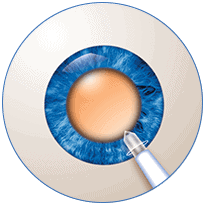Cataract Surgery

Watch and listen to a Cornerstone patient’s journey through cataract surgery.
Today's Cataract Surgery
Cataract surgery, or lens replacement, is the most frequently performed surgery in the United States. During this procedure your natural lens, that has become clouded, is removed and replaced with an intraocular lens (IOL). Today’s cataract surgery is even more advanced and safer than the days of your parents and grandparents. In fact, Cornerstone Eye Associates is on the forefront of technology that offers numerous benefits to our patients. Patients can expect the best results from our state-of-the-art cataract treatments.
- Outpatient procedure
- No stitches
- Safe
- Lens options for clear vision at all distances
- Now performed in our brand new, state-of-the-art surgery center exclusively for ophthalmology. The only one in the area! Learn More
How Cataract Surgery is Performed
During cataract surgery a small ultrasonic probe is inserted into the eye that breaks up, or emulsifies, the cloudy lens into tiny pieces and gently vacuums, or aspirates, those pieces out of the eye. Phaco surgery requires a small incision of only 2.8 mm or less. A combination of local anesthesia and IV sedation is used to make the procedure painless. With the advancement of IOLs, artificial lenses are implanted through the same small incision that is created in the phaco procedure. These IOLs are made of a flexible material, allowing them to be folded for implantation. Once inside the eye, the lens unfolds and returns to its original shape.
Advanced Lens Options in Cataract Surgery
We offer Lifestyle Intraocular Lenses including toric implants for astigmatism correction and multifocal (MF) or extended depth of focus lenses (EDOF) for those who want to reduce their dependency on glasses after cataract surgery.
FAQs
In some cases, new glasses may temporarily improve vision, but there are no medications or exercises that will help cataracts disappear.
While the characteristics of your eyes certainly play a critical role in lens selection, it’s also important to consider the role vision plays in the activities you enjoy. At your exam and pre-operative appointment, your surgeon and their team will help you select the lens that is the right fit for your vision and lifestyle.
The time for surgery is when cataracts are causing reduction of vision which affects your ability to perform activities of daily living such as driving at night or reading medicine bottles. The first step in detecting cataracts and determining your need for surgery is through a comprehensive exam with one of our surgeons.
Medicare and most insurances will cover most of the cost of traditional cataract surgery (with exception to co-pays and deductibles). If you choose to reduce your need for glasses with an advanced option, you will have additional costs that are not covered by insurance. Many patients consider the visual benefits worth the investment. Our practice is privately owned and operates independently from local hospitals. While we cannot accept URMC or RRH financial assistance or charity care programs, we’re happy to discuss your billing options and will help find the best solution for your needs.
-
Please plan on being with us for 2-3 hours for your appointment.
-
Your eyes will be dilated during this appointment; many patients find having a driver to be beneficial.
-
Please bring your insurance card(s), a list of your current medication (including name, dose, frequency and the reason for use), and the method of payment for your visit
-
If surgery is recommended, you may meet with a surgical coordinator to schedule your surgical appointments.Please note: Although you may choose one of our four convenient locations for your consultation, you may need to travel to one of our other locations for pre-operative testing and/or post-operative appointments.
Our cataract experts are always happy to answer any questions you may have.


